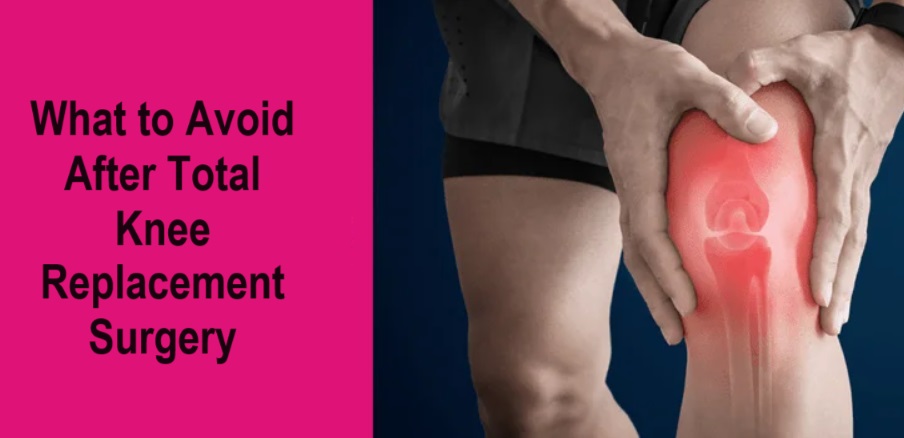After undergoing total knee replacement (TKR) surgery, it is crucial to follow a carefully tailored recovery plan to ensure optimal healing and long-term success.
Though the time it takes for an individual to recover fully totally depends upon person to person, it is quite often believed that a patient can fully walk on its own within a span of 6 weeks maximum.
Avoiding certain activities and behaviors is key to preventing complications and promoting a smooth rehabilitation process.
-
High-Impact Activities:
- After undergoing total knee replacement, steer clear of high-impact activities that put excessive stress on the knee joint.
- Activities like running, jumping, and participating in high-impact sport activities can compromise the longevity of the implant and potentially lead to loosening.
- Rather, put all your focus on low-impact exercises such as swimming, walking, etc. to preserve your joint health without taking any risks of damage or the fear of complications being arisen.
-
Ignoring Physiotherapy:
- Physiotherapy is a cornerstone of total knee replacement’s recovery process.
- Refrain from skipping or neglecting your prescribed set of exercises.
- Regular physiotherapy sessions help regain strength, flexibility levels, and range of motion.
- Maintaining consistency is the key, so stick to your physiotherapist’s suggestions to achieve the desired results.
-
Poor Pain Management:
- Effective pain management is vital for a smooth recovery process.
- Do not skip pain medicines as advised by your joint replacement or orthopedic surgeon.
- Consistent consumption of pain control medicines allows you to indulge in the required set of exercises and activities without feeling uncomfortable or any unnecessary discomfort.
- Try communicating any concerns or changes in pain levels to your doctor promptly.
-
Inadequate Rest:
- Taking adequate rest is important for the patient to heal in their recovery process.
- Abstain from overexerting yourself, especially in the early stages of the recovery process.
- Pay attention to your body, and if you feel fatigue or are feeling intense pain, take a little bit of short breaks and give yourself sufficient time for rest.
- Balancing activity with rest promotes a healthy recovery trajectory.
-
Neglecting Wound Care:
- Proper wound care is essential to prevent infections that may arise.
- Avoid neglecting your incision site and follow the guidelines provided by your orthopedic team.
- Keep the area clean, dry, and monitor for any signs or symptoms of infection, such as redness, swelling, or increased pain.
- Promptly report any concerns to your orthopedic doctor.
-
Rushing the Rehabilitation Process:
- While it is natural to wish for a speedy and early recovery, hurrying in the rehabilitation process can cause further complications and may also worsen your case.
- Avoid pushing yourself too hard or attempting advanced exercises without clearance from your medical team.
- Gradual progression in rehabilitation ensures a more stable and sustainable recovery.
-
Ignoring Weight Management:
- Excess body weight places additional stress on the knee joint.
- Refrain from adding more weight during your healing process and, if required, work on weight management strategies to keep a close check on your weight aspect.
- Maintaining a healthy weight lessens strain on the new joint, contributing to its longevity.
-
Neglecting Follow-Up Appointments:
- Regular follow-up appointments with your orthopedic surgeon are essential for monitoring your progress and recovery status.
- Try not to skip these appointments, as they provide an opportunity to address any concerns, evaluate healing, and make necessary adjustments to your treatment plan.
-
Ignoring Swelling or Bruising:
- Swelling and bruising are common after total knee replacement surgery, but persistent or severe symptoms should not be ignored.
- If you notice unusual swelling or discoloration, contact your doctor immediately.
- These signals could be considered as underlying issues that need proper attention.
-
Inadequate Hydration:
- Proper hydration is often overlooked but plays a crucial role in the recovery process.
- Staying well-hydrated supports overall health and helps prevent complications from arising.
- Avoid insufficient fluid intake, especially if you are taking medications that may increase the risk of dehydration.
-
Wearing Inappropriate or Uncomfortable Footwear:
- Choose footwear wisely to provide adequate support and stability.
- Avoid high heels or shoes that possess no adequate cushioning in them.
- Opt for comfortable, supportive footwear that promotes proper alignment and reduces strain on the knee joint.
-
Ignoring Warning Signs:
- Pay heed and listen to your body, be extra careful about any warning signals like increase in pain, instability concern, or unusual sounds arising from the joint.
- Ignoring these signs could lead to complications, so report them to your joint replacement surgeon with immediate effect.
Conclusion:
A successful healing process after total knee replacement surgery necessitates a blend of patience, abiding by the set of guidelines to follow, and a proactive way out to healthcare.
By avoiding certain activities and behaviors, patients can contribute to a smoother rehabilitation process and enjoy the benefits of an improved quality of life with their new knee joint given by the top orthopedic doctor.
Some of them include not going downhill skiing, playing contact sports like soccer, football, etc. It is generally more preferable to indulge in low-impact activities that do not even require twisting, jerking, running or pulling.
Involving yourself in acts such as gardening, hiking, playing golf or tennis, swimming, and so on are the activities that are most appropriate for the person to do after going through knee replacement surgery.
Adding more to it, it is always preferable to have a consultation with your doctor for personalized suggestions based on your particular condition and recovery status.
For more, it is advisable to visit the top-notch knee pain doctor in Delhi and get your queries answered.


